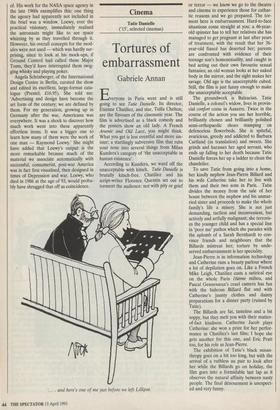Cinema
Tatie Danielle (`15', selected cinemas)
Tortures of embarrassment
Gabriele Annan
Everyone in Paris went and is still going to see Tatie Danielle. Its director, Etienne Chatiliez, and star, Tsilla Chelton, are the flavours of the cinematic year. The film is advertised as a black comedy and the posters show an old lady. A French Arsenic and Old Lace, you might think. What you get is less eventful and more sin- ister: a startlingly subversive film that rubs your nose into several things from Milan Kundera's category of 'the unacceptable in human existence'.
According to Kundera, we ward off the unacceptable with kitsch. Tatie Danielle is brutally kitsch-free. Chatiliez and his script-writer Florence Quentin set out to torment the audience: not with pity or grief
or terror — we know we go to the theatre and cinema to experience those for cathar- tic reasons and we go prepared. The tor- ment here is embarrassment. Hard-to-face situations come straight at you: a 46-year- old spinster has to tell her relatives she has managed to get pregnant at last after years of treatment, with the result that her 36- year-old fiance has deserted her; parents are confronted with evidence of their teenage son's homosexuality, and caught in bed acting out their own favourite sexual fantasies; an old woman looks at her naked body in the mirror, and the sight makes her savage. Old age is the unacceptable cubed. Still, the film is just funny enough to make the unacceptable acceptable.
The groundwork is Balzacian. Tatie Danielle, a colonel's widow, lives in provin- cial confort cossu in Auxerre. Twice in the course of the action you see her horrible, brilliantly chosen and brilliantly polished semi-orthopaedic shoes stamping on defenceless flowerbeds. She is spiteful, avaricious, greedy and addicted to Barbara Cartland (in translation) and sweets. She grinds and harasses her aged servant, who ends up falling to her death because Tatie Danielle forces her up a ladder to clean the chandelier.
To save Tatie from going into a home, her kindly nephew Jean-Pierre Billard and his wife Catherine take her to live with them and their two sons in Paris. Tatie divides the money from the sale of her house between the nephew and his unmar- ried sister and proceeds to make the whole family's life a misery. She is not just demanding, tactless and inconvenient, but actively and artfully malignant; she terroris- es the younger child and has a special line in 'poor me' pathos which she parades with the aplomb of a Sarah Bernhardt to con- vince friends and neighbours that the Billards mistreat her; torture by unde- served embarrassment is her speciality.
Jean-Pierre is in information technology and Catherine runs a beauty parlour where a lot of depilation goes on. Like a French Mike Leigh, Chatiliez casts a satirical eye on the whole Paris 16ieme milieu, and Pascal Gennesseux's cruel camera has fun with the hideous Billard flat and with Catherine's jaunty clothes and dainty preparations for a dinner party (ruined by Tatie).
The Billards are fat, tasteless and a bit soppy, but they melt you with their matter- of-fact kindness. Catherine Jacob plays Catherine: she won a prize for her perfor- mance in Chatiliez's last film; I hope she gets another for this one, and Eric Pratt too, for his role as Jean-Pierre.
The exhibition of Tatie's black misan- thropy goes on a bit too long, but with the arrival of a ruthless au pair to look after her while the Billards go on holiday, the film goes into a formidable last lap as it observes the natural affinity between nasty people. The final denouement is unexpect- ed and very funny.


























































 Previous page
Previous page